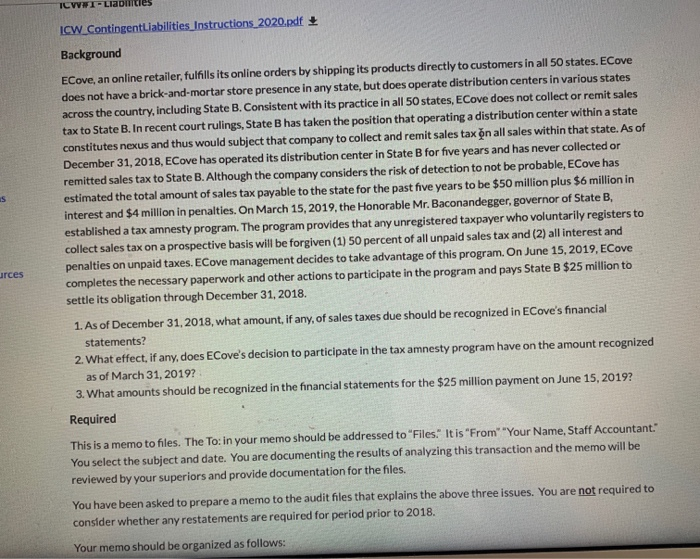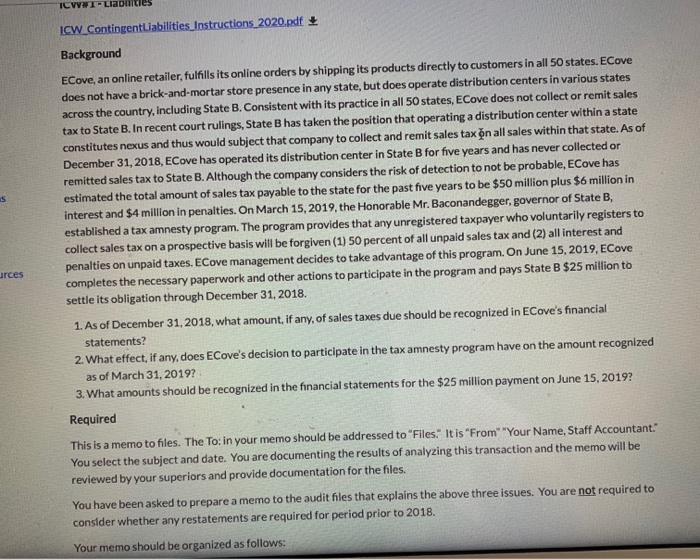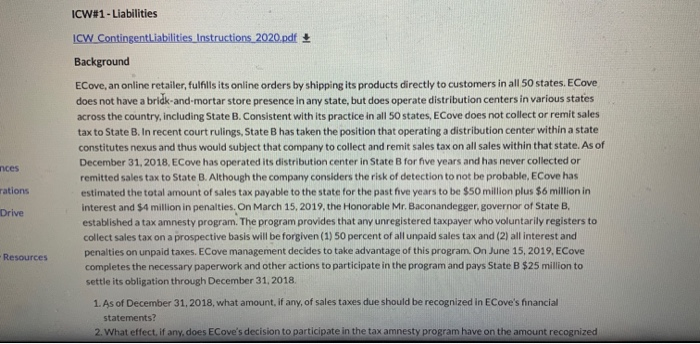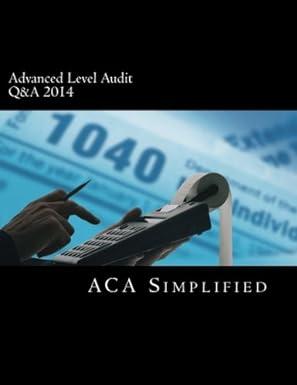IC VI-Liabilities s urces ICW_ContingentLiabilities Instructions 2020.pdf Background ECove, an online retailer, fulfills its online orders by shipping its products directly to customers in all 50 states. ECove does not have a brick-and-mortar store presence in any state, but does operate distribution centers in various states across the country, including State B. Consistent with its practice in all 50 states, ECove does not collect or remit sales tax to State B. In recent court rulings, State B has taken the position that operating a distribution center within a state constitutes nexus and thus would subject that company to collect and remit sales tax on all sales within that state. As of December 31, 2018, ECove has operated its distribution center in State B for five years and has never collected or remitted sales tax to State B. Although the company considers the risk of detection to not be probable, ECove has estimated the total amount of sales tax payable to the state for the past five years to be $50 million plus $6 million in interest and $4 million in penalties. On March 15, 2019, the Honorable Mr. Baconandegger, governor of State B, established a tax amnesty program. The program provides that any unregistered taxpayer who voluntarily registers to collect sales tax on a prospective basis will be forgiven (1) 50 percent of all unpaid sales tax and (2) all interest and penalties on unpaid taxes. ECove management decides to take advantage of this program. On June 15, 2019, ECove completes the necessary paperwork and other actions to participate in the program and pays State B $25 million to settle its obligation through December 31, 2018. 1. As of December 31, 2018, what amount, if any, of sales taxes due should be recognized in ECove's financial statements? 2. What effect, if any, does ECove's decision to participate in the tax amnesty program have on the amount recognized as of March 31, 2019? 3. What amounts should be recognized in the financial statements for the $25 million payment on June 15, 2019? Required This is a memo to files. The To: in your memo should be addressed to "Files. It is "From "Your Name, Staff Accountant." You select the subject and date. You are documenting the results of analyzing this transaction and the memo will be reviewed by your superiors and provide documentation for the files. You have been asked to prepare a memo to the audit files that explains the above three issues. You are not required to consider whether any restatements are required for period prior to 2018. Your memo should be organized as follows: ICV I-Liabilities s urces ICW_ContingentLiabilities Instructions_2020.pdf Background ECove, an online retailer, fulfills its online orders by shipping its products directly to customers in all 50 states. ECove does not have a brick-and-mortar store presence in any state, but does operate distribution centers in various states across the country, including State B. Consistent with its practice in all 50 states, ECove does not collect or remit sales tax to State B. In recent court rulings, State B has taken the position that operating a distribution center within a state constitutes nexus and thus would subject that company to collect and remit sales tax on all sales within that state. As of December 31, 2018, ECove has operated its distribution center in State B for five years and has never collected or remitted sales tax to State B. Although the company considers the risk of detection to not be probable, ECove has estimated the total amount of sales tax payable to the state for the past five years to be $50 million plus $6 million in interest and $4 million in penalties. On March 15, 2019, the Honorable Mr. Baconandegger, governor of State B. established a tax amnesty program. The program provides that any unregistered taxpayer who voluntarily registers to collect sales tax on a prospective basis will be forgiven (1) 50 percent of all unpaid sales tax and (2) all interest and penalties on unpaid taxes. ECove management decides to take advantage of this program. On June 15, 2019, ECove completes the necessary paperwork and other actions to participate in the program and pays State B $25 million to settle its obligation through December 31, 2018. 1. As of December 31, 2018, what amount, if any, of sales taxes due should be recognized in ECove's financial statements? 2. What effect, if any, does ECove's decision to participate in the tax amnesty program have on the amount recognized as of March 31, 2019? 3. What amounts should be recognized in the financial statements for the $25 million payment on June 15, 2019? Required This is a memo to files. The To: in your memo should be addressed to "Files. It is "From "Your Name, Staff Accountant." You select the subject and date. You are documenting the results of analyzing this transaction and the memo will be reviewed by your superiors and provide documentation for the files. You have been asked to prepare a memo to the audit files that explains the above three issues. You are not required to consider whether any restatements are required for period prior to 2018. Your memo should be organized as follows: ICW#1 - Liabilities nces rations ICW ContingentLiabilities Instructions 2020.pdf Background ECove, an online retailer, fulfills its online orders by shipping its products directly to customers in all 50 states. ECove does not have a bridk-and-mortar store presence in any state, but does operate distribution centers in various states across the country, including State B. Consistent with its practice in all 50 states, Ecove does not collect or remit sales tax to State B. In recent court rulings, State B has taken the position that operating a distribution center within a state constitutes nexus and thus would subject that company to collect and remit sales tax on all sales within that state. As of December 31, 2018, ECove has operated its distribution center in State B for five years and has never collected or remitted sales tax to State B. Although the company considers the risk of detection to not be probable, ECove has estimated the total amount of sales tax payable to the state for the past five years to be $50 million plus $6 million in interest and $4 million in penalties. On March 15, 2019, the Honorable Mr. Baconandegger, governor of State B, established a tax amnesty program. The program provides that any unregistered taxpayer who voluntarily registers to collect sales tax on a prospective basis will be forgiven (1) 50 percent of all unpaid sales tax and (2) all interest and penalties on unpaid taxes. ECove management decides to take advantage of this program. On June 15, 2019. ECove completes the necessary paperwork and other actions to participate in the program and pays State B $25 million to settle its obligation through December 31, 2018 1. As of December 31, 2018, what amount, if any, of sales taxes due should be recognized in ECove's financial statements? 2. What effect, if any, does ECove's decision to participate in the tax amnesty program have on the amount recognized Drive Resources









